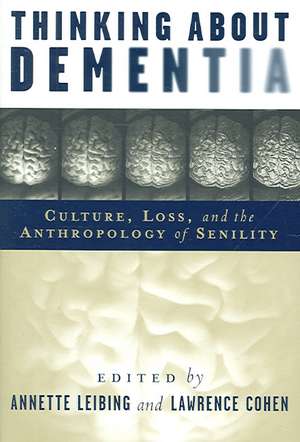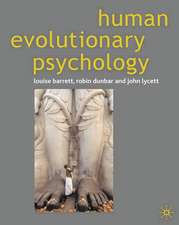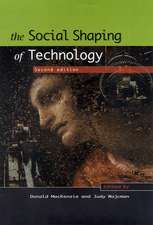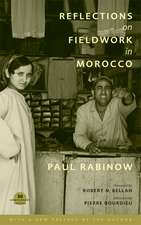Thinking About Dementia: Culture, Loss, and the Anthropology of Senility: Studies in Medical Anthropology
Autor Professor Annette Leibing, Professor Lawrence Cohenen Limba Engleză Paperback – 15 feb 2006 – vârsta ani
Bringing together essays by nineteen respected scholars, this volume approaches dementia from a variety of angles, exploring its historical, psychological, and philosophical implications. The authors employ a cross-cultural perspective that is based on ethnographic fieldwork and focuses on questions of age, mind, voice, self, loss, temporality, memory, and affect.
Taken together, the essays make four important and interrelated contributions to our understanding of the mental status of the elderly. First, cross-cultural data show that the aging process, while biologically influenced, is also culturally constructed. Second, ethnographic reports raise questions about the diagnostic criteria used for defining the elderly as demented. Third, case studies show how a diagnosis affects a patient's treatment in both clinical and familial settings. Finally, the collection highlights the gap that separates current biological understandings of aging from its cultural meanings.
As Alzheimer's disease and other forms of dementia continue to command an ever-increasing amount of attention in medicine and psychology, this book will be essential reading for anthropologists, social scientists, and health care professionals.
Taken together, the essays make four important and interrelated contributions to our understanding of the mental status of the elderly. First, cross-cultural data show that the aging process, while biologically influenced, is also culturally constructed. Second, ethnographic reports raise questions about the diagnostic criteria used for defining the elderly as demented. Third, case studies show how a diagnosis affects a patient's treatment in both clinical and familial settings. Finally, the collection highlights the gap that separates current biological understandings of aging from its cultural meanings.
As Alzheimer's disease and other forms of dementia continue to command an ever-increasing amount of attention in medicine and psychology, this book will be essential reading for anthropologists, social scientists, and health care professionals.
Din seria Studies in Medical Anthropology
-
 Preț: 323.22 lei
Preț: 323.22 lei -
 Preț: 286.52 lei
Preț: 286.52 lei -
 Preț: 313.73 lei
Preț: 313.73 lei -
 Preț: 307.48 lei
Preț: 307.48 lei -
 Preț: 314.50 lei
Preț: 314.50 lei -
 Preț: 304.82 lei
Preț: 304.82 lei -
 Preț: 288.59 lei
Preț: 288.59 lei -
 Preț: 332.77 lei
Preț: 332.77 lei - 20%
 Preț: 191.44 lei
Preț: 191.44 lei - 32%
 Preț: 216.74 lei
Preț: 216.74 lei - 21%
 Preț: 232.00 lei
Preț: 232.00 lei - 20%
 Preț: 253.66 lei
Preț: 253.66 lei - 37%
 Preț: 184.99 lei
Preț: 184.99 lei - 30%
 Preț: 178.94 lei
Preț: 178.94 lei - 28%
 Preț: 191.97 lei
Preț: 191.97 lei - 21%
 Preț: 231.42 lei
Preț: 231.42 lei
Preț: 316.16 lei
Nou
Puncte Express: 474
Preț estimativ în valută:
60.50€ • 63.62$ • 49.99£
60.50€ • 63.62$ • 49.99£
Carte tipărită la comandă
Livrare economică 17 aprilie-01 mai
Preluare comenzi: 021 569.72.76
Specificații
ISBN-13: 9780813538037
ISBN-10: 0813538033
Pagini: 299
Ilustrații: 1
Dimensiuni: 152 x 229 x 18 mm
Greutate: 0.4 kg
Ediția:None
Editura: Rutgers University Press
Colecția Rutgers University Press
Seria Studies in Medical Anthropology
ISBN-10: 0813538033
Pagini: 299
Ilustrații: 1
Dimensiuni: 152 x 229 x 18 mm
Greutate: 0.4 kg
Ediția:None
Editura: Rutgers University Press
Colecția Rutgers University Press
Seria Studies in Medical Anthropology
Notă biografică
Annette Leibing is a professor at the Institute of Psychiatry, Federal University of Rio de Janeiro and a researcher at the Institute of Social Gerontology of Quebec and MOS/Universit de Montral. Lawrence Cohen is an associate professor of anthropology and South and Southeast Asian studies, and director of the Medical Anthropology Program at the University of California, Berkeley.
Cuprins
Contents
Acknowledgements vii
Introduction 1
Part One
1 Dementia-Near-Death and "Life Itself" 23
2 The Borderlands of Primary Care 43
3 Negotiating the Moral Status of Trouble 64
4 Diagnosing Dementia 80
5 The Biomedical Deconstruction of Senility and the Persistent Stigmatization of Old Age in the United States 106
Part Two
6 Generic Susceptibility and Alzheimer's Disease 123
Part Three
7 Coherence without Facticity in Dementia 157
8 Creative Storytelling and Self-Expression among People with Dementia 180
9 Embodies Selfhood 195
10 Normality and Difference 218
11Divided Gazes 240
12 Being a Good Rojin 269
Contributions 289
Index 291
Acknowledgements vii
Introduction 1
Part One
1 Dementia-Near-Death and "Life Itself" 23
2 The Borderlands of Primary Care 43
3 Negotiating the Moral Status of Trouble 64
4 Diagnosing Dementia 80
5 The Biomedical Deconstruction of Senility and the Persistent Stigmatization of Old Age in the United States 106
Part Two
6 Generic Susceptibility and Alzheimer's Disease 123
Part Three
7 Coherence without Facticity in Dementia 157
8 Creative Storytelling and Self-Expression among People with Dementia 180
9 Embodies Selfhood 195
10 Normality and Difference 218
11Divided Gazes 240
12 Being a Good Rojin 269
Contributions 289
Index 291
Recenzii
"A seminal contribution to the field of medical anthropology on an extremely important topic. A useful and interesting volume for undergraduates, graduate students, and medical researchers in dementia."
Descriere
Bringing together essays by nineteen respected scholars, this volume approaches dementia from a variety of angles, exploring its historical, psychological, and philosophical implications. The authors employ a cross-cultural perspective that is based on ethnographic fieldwork and focuses on questions of age, mind, voice, self, loss, temporality, memory, and affect.
Taken together, the essays make four important and interrelated contributions to our understanding of the mental status of the elderly. First, cross-cultural data show that the aging process, while biologically influenced, is also culturally constructed. Second, ethnographic reports raise questions about the diagnostic criteria used for defining the elderly as demented. Third, case studies show how a diagnosis affects a patient's treatment in both clinical and familial settings. Finally, the collection highlights the gap that separates current biological understandings of aging from its cultural meanings.
Taken together, the essays make four important and interrelated contributions to our understanding of the mental status of the elderly. First, cross-cultural data show that the aging process, while biologically influenced, is also culturally constructed. Second, ethnographic reports raise questions about the diagnostic criteria used for defining the elderly as demented. Third, case studies show how a diagnosis affects a patient's treatment in both clinical and familial settings. Finally, the collection highlights the gap that separates current biological understandings of aging from its cultural meanings.












